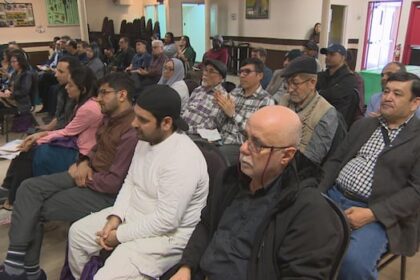ManitobaChild safety experts are warning parents and teenagers to carefully consider the risks of sharing their real-time location as the practice becomes increasingly common for youth on social media.Canadian Centre for Child Protection says parents should talk with children about location-sharing habitsCBC News · Posted: Sep 10, 2025 7:07 PM EDT | Last Updated: 4 hours agoSocial media platforms like Instagram and Snapchat offer location sharing features that place a user’s avatar on a physical map that’s visible to their network, potentially revealing locations like their home or school. (tomeqs/Shutterstock)Child safety experts are warning parents and teenagers to carefully consider the risks of sharing their real-time location as the practice becomes increasingly common for youth on social media. Social media platforms like Instagram and Snapchat offer location sharing features that place a user’s avatar on a physical map that’s visible to their network. Depending on user settings, their avatar may move across the map in real time — revealing locations like their home or school. Jacques Marcoux, research and analytics director with the Canadian Centre for Child Protection in Winnipeg, says “blanket sharing” this sensitive information with a wide network of contacts could put teens at greater risk of sextortion, coercive control and emotional distress. Sextortion is a type of online blackmail where someone threatens to send sexual images or videos of a person to others unless the victim meets their demands. “Depending on what settings you have on your location sharing, you may now have given a sextorter direct access to your real-time location,” Marcoux said. “Then they are in a position to then leverage that information to threaten and intimidate you.”Marcoux said his organization has received reports of sextortion cases through the Cybertip.ca hotline where a victim’s location information was used as a threat against them. Jacques Marcoux, director of research and analytics with the Canadian Centre for Child Protection, says teens should limit sharing their location to a trusted circle of friends and loved ones. (Submitted by Jacques Marcoux)The Winnipeg-based centre said the expectation of location sharing among social groups may mean some teens’ partners can track their locations, putting them at risk of coercive control and abuse. “I think it’s important for parents to have those conversations with their kids and for those kids to take stock of who they’re sharing their information with,” said Marcoux, a former CBC reporter.Parents can help their children stay safe online — and ultimately offline — by encouraging them to consider the social pressures and risks associated with sharing their physical locations on social media, the child protection centre says. They may want to encourage children to limit sharing functions and restrict information to a narrow group of trusted individuals. Marcoux said he would like to see social media companies ensure location sharing is turned off as a default setting, with users having to opt in to access those features. These settings can also be turned on and off if a user wants to share their location for a short period of time. He said platforms should also consider sending regular prompts for users to take stock of their networks and remove users they don’t want their location shared with. WATCH | Jacques Marcoux on the perils of location sharing:Online location sharing puts kids at risk, experts warnThe Canadian Centre for Child Protection is issuing a warning to parents. It says kids are often sharing their locations online through social media, and its putting them at risk.With files from Faith Fundal and Up To Speed
Friday, 6 Feb 2026
Canada – The Illusion
Search
Have an existing account?
Sign In
© 2022 Foxiz News Network. Ruby Design Company. All Rights Reserved.
You May also Like
- More News:
- history
- Standing Bear Network
- John Gonzalez
- ᐊᔭᐦᑊ ayahp — It happened
- Creation
- Beneath the Water
- Olympic gold medal
- Jim Thorpe
- type O blood
- the bringer of life
- Raven
- Wás’agi
- NoiseCat
- 'Sugarcane'
- The rivers still sing
- ᑲᓂᐸᐏᐟ ᒪᐢᑿ
- ᐅᑳᐤ okâw — We remember
- ᐊᓂᓈᐯᐃᐧᐣ aninâpêwin — Truth
- This is what it means to be human.
- Nokoma










